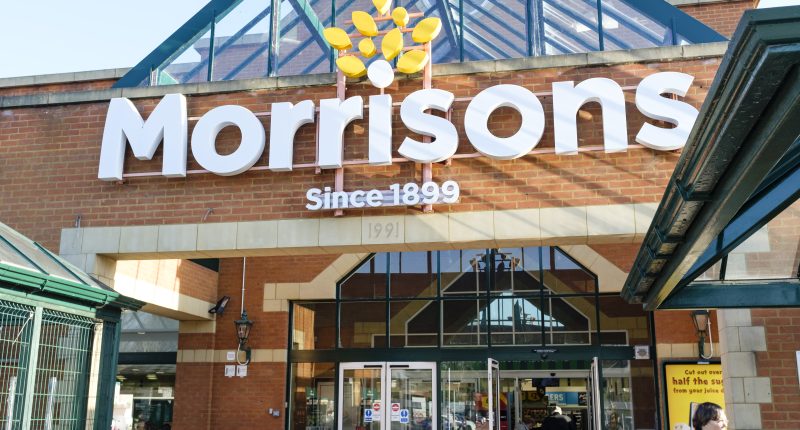A MAJOR supermarket has sold 337 petrol stations as part of a £2.5billion deal.
Morrisons said it had agreed to sell hundreds of its petrol forecourts to Motor Fuel Group (MFG).
The group has the same private equity owner as the supermarket.
Motor Fuel Group began talks with the supermarket chain Morrisons for 340 fuel retail forecourts back in September.
The group is the UK’s largest independent forecourt operator and provides services at over 900 sites, while Morrisons is Britain’s fifth-largest supermarket group.
Both Morrisons and MFG are controlled by the US private equity group Clayton Dubilier & Rice (CD&R).
Read more in money
As part of the transaction, Morrisons will take a minority stake of approximately 20% in MFG, and enter into commercial and supply agreements with MFG.
As a result of this agreement, Morrisons’ branding will remain on all the 337 petrol stations affected.
The supermarket has also committed to ensuring ‘”value-for-money supermarket fuel” pricing across the sites.
However, MFG will operate a different model to Morrisons with colleagues employed directly by the franchise holder.
Most read in Money
It means that every Morrisons forecourt colleague will be re-hired but provided with an in-store position on the same pay and employment terms.
There will be no compulsory redundancies, according to the firm.
The supermarket has also agreed for MFG to acquire more than 400 associated sites across the UK for ultra-rapid electric vehicle (EV) charging development.
“MFG is already committed to invest £400 million over 10 years into building ultra-rapid EV hubs across their existing 900-strong MFG forecourt network,” MFG’s statement said.
Rami Baitieh, chief executive of Morrisons, said: “As the needs of the customer continue to evolve, Morrisons and MFG’s partnership will see us combine our respective expertise and resources to deliver the best value for customers at the pump, in our convenience stores and in our supermarkets.
“It means Morrisons customers will continue to see a competitive and attractive forecourt offering, including expanded access to EV charging, while also benefiting from greater focus on investment in Morrisons’ core food business.”
The deal will free up cash to pay down Morrisons debts.
And it comes just weeks after the firm’s new boss told staff that the supermarket chain needed an “urgent overhaul”.
Mr Baitieh told staff that businesses are like “candles that will burn out unless they change” at a recent meeting.
A Morrisons insider told the The Times that “It was a a ‘gulp’ moment for everyone,” went they heard the news.
At 7pm each evening, from Monday to Saturday, the top 150 staff members at the supermarket chain are required to join Mr Baitiéh on an hour-long meeting.
These are used by Mr Baitiéh to share what he has learnt and observed from his regular unannounced store visits.
The Morrisons boss has even put his email address on the complaints section of the supermarket’s website and shares many of these with staff.
As far as change goes, Mr Baitiéh has said that he wants to hand more power to both buyers and store managers.
He also wants to vastly improve in-store stock.
David Potts, the ex-chief executive, led a turnaround at the Bradford-based group, steering it through the coronavirus pandemic and expanding its convenience store business through the acquisition of McColl’s.
But Morrisons’ problems can largely be traced back to 2021 when private equity giant Clayton Dubilier & Rice (CD&R) paid a knockout £7 billion to acquire the chain.
What is a private equity?
PRIVATE equity firms often say they can run companies more effectively by bringing in a crack team focused on efficiency and stripping out costs.
They buy businesses using a mixture of debt raised from investors and the target company’s own assets — including cash on its balance sheet and property owned.
By only putting in a little of their own cash to fund a takeover, the firms limit their risk — and have the potential to make even bigger profits.
The debt loaded on the target company has to be repaid by the business as annual interest repayments.
This means if interest rates shoot higher, the company will be under even more pressure to generate cash to pay for the more expensive debt.
And Morrisons’ performance continues to lag major rivals.
In 2021, the business had £2billion borrowings.
READ MORE SUN STORIES
That has now shot up to £5.5billion — triggering large interest payments and leaving it vulnerable to soaring rates.
With more than 110,000 staff, the chain racked up so much debt in the year after the takeover that it faced about £400million finance costs to pay off annual interest.










